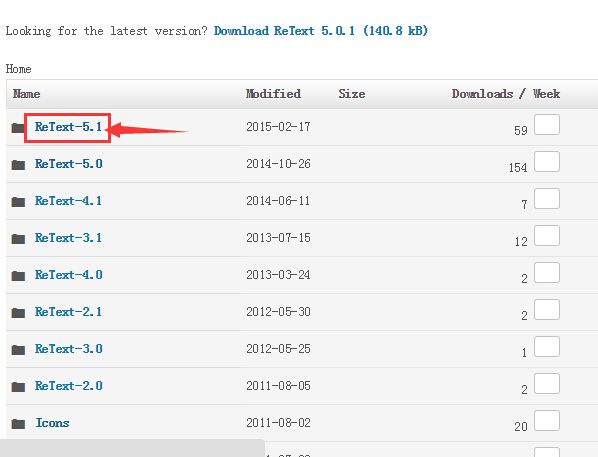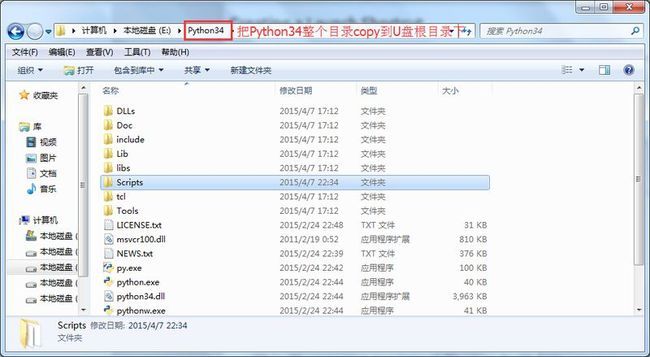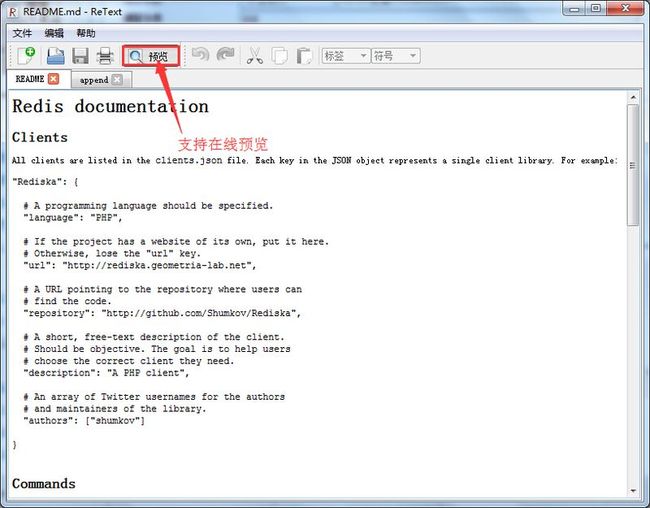ReText 是一个使用 Markdown 语法和 reStructuredText (reST) 结构的文本编辑器,编辑的内容支持导出到 PDF、ODT 和 HTML 以及纯文本,支持即时预览、网页生成以及 HTML 语法高亮、全屏模式等。
现在很多开源框架的用户文档都使用MakeDown语言编写,比如Redis。网上Google了下,大家都说ReText好用,安装使用后,感觉果然如此,UI做的很精致。ReText是基于Python的,所以必须首先安装PyThon.
1.下载并安装Python.
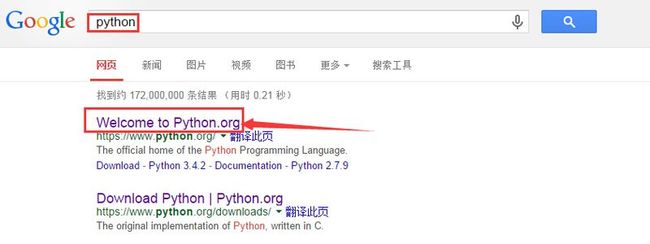


安装我就不说了,我是安装到E:\Python34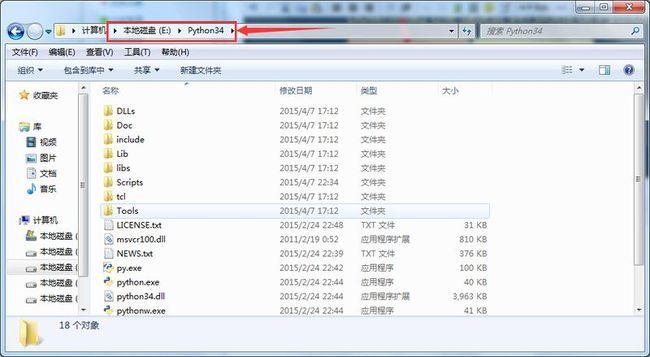
2.下载并安装PyQT5,下载地址:
http://www.riverbankcomputing.co.uk/software/pyqt/download5
请根据自己操作系统位数选择下载:
3.设置环境变量
变量值:E:\Python34\Lib\;E:\Python34\Lib\site-packages\
变量值请根据自己实际的安装路径适当修改,你懂的哈。
同理继续添加QT_QPA_PLATFORM_PLUGIN_PATH系统变量
变量名:QT_QPA_PLATFORM_PLUGIN_PATH
变量值:E:\Python34\Lib\site-packages\PyQt5\plugins\platforms
然后选中Path系统环境变量,然后点“编辑”,在变量值最前面添加上:
E:\Python34;E:\Python34\Lib\site-packages\PyQt5;
4.下载并安装easy_install工具
首先下载ez_setup.py,你可以自己根据文件名去google,也可以根据我提供的文件内容自己新建
#!/usr/bin/env python
"""
Setuptools bootstrapping installer.
Run this script to install or upgrade setuptools.
"""
import os
import shutil
import sys
import tempfile
import zipfile
import optparse
import subprocess
import platform
import textwrap
import contextlib
import warnings
from distutils import log
try:
from urllib.request import urlopen
except ImportError:
from urllib2 import urlopen
try:
from site import USER_SITE
except ImportError:
USER_SITE = None
DEFAULT_VERSION = "15.0"
DEFAULT_URL = "https://pypi.python.org/packages/source/s/setuptools/"
DEFAULT_SAVE_DIR = os.curdir
def _python_cmd(*args):
"""
Execute a command.
Return True if the command succeeded.
"""
args = (sys.executable,) + args
return subprocess.call(args) == 0
def _install(archive_filename, install_args=()):
"""Install Setuptools."""
with archive_context(archive_filename):
# installing
log.warn('Installing Setuptools')
if not _python_cmd('setup.py', 'install', *install_args):
log.warn('Something went wrong during the installation.')
log.warn('See the error message above.')
# exitcode will be 2
return 2
def _build_egg(egg, archive_filename, to_dir):
"""Build Setuptools egg."""
with archive_context(archive_filename):
# building an egg
log.warn('Building a Setuptools egg in %s', to_dir)
_python_cmd('setup.py', '-q', 'bdist_egg', '--dist-dir', to_dir)
# returning the result
log.warn(egg)
if not os.path.exists(egg):
raise IOError('Could not build the egg.')
class ContextualZipFile(zipfile.ZipFile):
"""Supplement ZipFile class to support context manager for Python 2.6."""
def __enter__(self):
return self
def __exit__(self, type, value, traceback):
self.close()
def __new__(cls, *args, **kwargs):
"""Construct a ZipFile or ContextualZipFile as appropriate."""
if hasattr(zipfile.ZipFile, '__exit__'):
return zipfile.ZipFile(*args, **kwargs)
return super(ContextualZipFile, cls).__new__(cls)
@contextlib.contextmanager
def archive_context(filename):
"""
Unzip filename to a temporary directory, set to the cwd.
The unzipped target is cleaned up after.
"""
tmpdir = tempfile.mkdtemp()
log.warn('Extracting in %s', tmpdir)
old_wd = os.getcwd()
try:
os.chdir(tmpdir)
with ContextualZipFile(filename) as archive:
archive.extractall()
# going in the directory
subdir = os.path.join(tmpdir, os.listdir(tmpdir)[0])
os.chdir(subdir)
log.warn('Now working in %s', subdir)
yield
finally:
os.chdir(old_wd)
shutil.rmtree(tmpdir)
def _do_download(version, download_base, to_dir, download_delay):
"""Download Setuptools."""
egg = os.path.join(to_dir, 'setuptools-%s-py%d.%d.egg'
% (version, sys.version_info[0], sys.version_info[1]))
if not os.path.exists(egg):
archive = download_setuptools(version, download_base,
to_dir, download_delay)
_build_egg(egg, archive, to_dir)
sys.path.insert(0, egg)
# Remove previously-imported pkg_resources if present (see
# https://bitbucket.org/pypa/setuptools/pull-request/7/ for details).
if 'pkg_resources' in sys.modules:
del sys.modules['pkg_resources']
import setuptools
setuptools.bootstrap_install_from = egg
def use_setuptools(
version=DEFAULT_VERSION, download_base=DEFAULT_URL,
to_dir=DEFAULT_SAVE_DIR, download_delay=15):
"""
Ensure that a setuptools version is installed.
Return None. Raise SystemExit if the requested version
or later cannot be installed.
"""
to_dir = os.path.abspath(to_dir)
# prior to importing, capture the module state for
# representative modules.
rep_modules = 'pkg_resources', 'setuptools'
imported = set(sys.modules).intersection(rep_modules)
try:
import pkg_resources
pkg_resources.require("setuptools>=" + version)
# a suitable version is already installed
return
except ImportError:
# pkg_resources not available; setuptools is not installed; download
pass
except pkg_resources.DistributionNotFound:
# no version of setuptools was found; allow download
pass
except pkg_resources.VersionConflict as VC_err:
if imported:
_conflict_bail(VC_err, version)
# otherwise, unload pkg_resources to allow the downloaded version to
# take precedence.
del pkg_resources
_unload_pkg_resources()
return _do_download(version, download_base, to_dir, download_delay)
def _conflict_bail(VC_err, version):
"""
Setuptools was imported prior to invocation, so it is
unsafe to unload it. Bail out.
"""
conflict_tmpl = textwrap.dedent("""
The required version of setuptools (>={version}) is not available,
and can't be installed while this script is running. Please
install a more recent version first, using
'easy_install -U setuptools'.
(Currently using {VC_err.args[0]!r})
""")
msg = conflict_tmpl.format(**locals())
sys.stderr.write(msg)
sys.exit(2)
def _unload_pkg_resources():
del_modules = [
name for name in sys.modules
if name.startswith('pkg_resources')
]
for mod_name in del_modules:
del sys.modules[mod_name]
def _clean_check(cmd, target):
"""
Run the command to download target.
If the command fails, clean up before re-raising the error.
"""
try:
subprocess.check_call(cmd)
except subprocess.CalledProcessError:
if os.access(target, os.F_OK):
os.unlink(target)
raise
def download_file_powershell(url, target):
"""
Download the file at url to target using Powershell.
Powershell will validate trust.
Raise an exception if the command cannot complete.
"""
target = os.path.abspath(target)
ps_cmd = (
"[System.Net.WebRequest]::DefaultWebProxy.Credentials = "
"[System.Net.CredentialCache]::DefaultCredentials; "
"(new-object System.Net.WebClient).DownloadFile(%(url)r, %(target)r)"
% vars()
)
cmd = [
'powershell',
'-Command',
ps_cmd,
]
_clean_check(cmd, target)
def has_powershell():
"""Determine if Powershell is available."""
if platform.system() != 'Windows':
return False
cmd = ['powershell', '-Command', 'echo test']
with open(os.path.devnull, 'wb') as devnull:
try:
subprocess.check_call(cmd, stdout=devnull, stderr=devnull)
except Exception:
return False
return True
download_file_powershell.viable = has_powershell
def download_file_curl(url, target):
cmd = ['curl', url, '--silent', '--output', target]
_clean_check(cmd, target)
def has_curl():
cmd = ['curl', '--version']
with open(os.path.devnull, 'wb') as devnull:
try:
subprocess.check_call(cmd, stdout=devnull, stderr=devnull)
except Exception:
return False
return True
download_file_curl.viable = has_curl
def download_file_wget(url, target):
cmd = ['wget', url, '--quiet', '--output-document', target]
_clean_check(cmd, target)
def has_wget():
cmd = ['wget', '--version']
with open(os.path.devnull, 'wb') as devnull:
try:
subprocess.check_call(cmd, stdout=devnull, stderr=devnull)
except Exception:
return False
return True
download_file_wget.viable = has_wget
def download_file_insecure(url, target):
"""Use Python to download the file, without connection authentication."""
src = urlopen(url)
try:
# Read all the data in one block.
data = src.read()
finally:
src.close()
# Write all the data in one block to avoid creating a partial file.
with open(target, "wb") as dst:
dst.write(data)
download_file_insecure.viable = lambda: True
def get_best_downloader():
downloaders = (
download_file_powershell,
download_file_curl,
download_file_wget,
download_file_insecure,
)
viable_downloaders = (dl for dl in downloaders if dl.viable())
return next(viable_downloaders, None)
def download_setuptools(
version=DEFAULT_VERSION, download_base=DEFAULT_URL,
to_dir=DEFAULT_SAVE_DIR, delay=15,
downloader_factory=get_best_downloader):
"""
Download setuptools from a specified location and return its filename.
`version` should be a valid setuptools version number that is available
as an sdist for download under the `download_base` URL (which should end
with a '/'). `to_dir` is the directory where the egg will be downloaded.
`delay` is the number of seconds to pause before an actual download
attempt.
``downloader_factory`` should be a function taking no arguments and
returning a function for downloading a URL to a target.
"""
# making sure we use the absolute path
to_dir = os.path.abspath(to_dir)
zip_name = "setuptools-%s.zip" % version
url = download_base + zip_name
saveto = os.path.join(to_dir, zip_name)
if not os.path.exists(saveto): # Avoid repeated downloads
log.warn("Downloading %s", url)
downloader = downloader_factory()
downloader(url, saveto)
return os.path.realpath(saveto)
def _build_install_args(options):
"""
Build the arguments to 'python setup.py install' on the setuptools package.
Returns list of command line arguments.
"""
return ['--user'] if options.user_install else []
def _parse_args():
"""Parse the command line for options."""
parser = optparse.OptionParser()
parser.add_option(
'--user', dest='user_install', action='store_true', default=False,
help='install in user site package (requires Python 2.6 or later)')
parser.add_option(
'--download-base', dest='download_base', metavar="URL",
default=DEFAULT_URL,
help='alternative URL from where to download the setuptools package')
parser.add_option(
'--insecure', dest='downloader_factory', action='store_const',
const=lambda: download_file_insecure, default=get_best_downloader,
help='Use internal, non-validating downloader'
)
parser.add_option(
'--version', help="Specify which version to download",
default=DEFAULT_VERSION,
)
parser.add_option(
'--to-dir',
help="Directory to save (and re-use) package",
default=DEFAULT_SAVE_DIR,
)
options, args = parser.parse_args()
# positional arguments are ignored
return options
def _download_args(options):
"""Return args for download_setuptools function from cmdline args."""
return dict(
version=options.version,
download_base=options.download_base,
downloader_factory=options.downloader_factory,
to_dir=options.to_dir,
)
def main():
"""Install or upgrade setuptools and EasyInstall."""
options = _parse_args()
archive = download_setuptools(**_download_args(options))
return _install(archive, _build_install_args(options))
if __name__ == '__main__':
sys.exit(main())
双击ez_setup.py开始安装easy_install.
5.cmd打开命令行窗口,切换到E:\Python34\Scripts目录下,依次顺序执行如下命令:
pip install Pygments
pip install Markdown
pip install docutils
pip install Markups
6.下载并解压ReText

解压ReText到任意盘符,然后解压图标文件压缩包,把得到的所有图标文件copy到ReText的icons文件夹下:如图
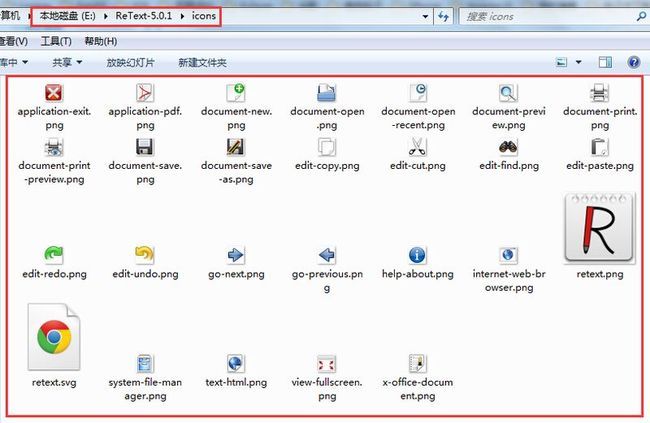
我的ReText是解压到E盘,这样ReText就可以使用了,
当然为了方便起见,你也可以把retext.py文件发送到桌面快捷方式。
REM ReText Startup batch file
REM -------------------------
REM determine drive letter of batchfile
for /f "delims=\" %%d in ('cd') do set curdrv=%%d
echo %curdrv%
REM Set ENVs using current drive letter if ENVs not set for USB Sticks
REM REM them out if you have the ENVs set
set PYTHONPATH=%curdrv%\Python34\Lib;%curdrv%\Python34\Lib\site-packages
set PATH=%curdrv%\Python34;%curdrv%\Python34\Lib\site-packages\PyQt5\bin;%PATH%
REM Start ReText
start /B %curdrv%\Python34\pythonw.exe %CD%\retext.py
以后只要双击retext.bat文件即可打开ReText.
ReText主界面如图:

是不是觉得So beautiful?如果你也有同感,就跟我一起玩玩它吧!其实哥可不是什么外貌协会,ReText吸引我的是它支持MD导出为HTML文件和PDF文件,这是一大亮点,对于我来说。







